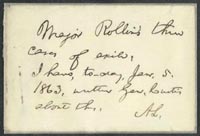 Iran’s Attack on Israel
Iran’s Attack on Israel


4 min read
3 min read
7 min read
2 min read
 In 1863, General Ulysses S. Grant was instructed to revoke Order No. 11, which had called for the expulsion of all Jews from Tennessee, Kentucky and Mississippi. During the Civil War, smugglers were illegally selling southern cotton to the northern textile factories. Grant, commander of U.S. Army forces, believed that Jews were primarily behind this illegal cotton trade, and he decided to expel all Jews from southern territory. Grant wrote: "No Jews are to be permitted to travel on the railroad southward from any point... The [region] must be purged of them." Based on Grant's orders, Jews were expelled from their homes, including 20 families from the town of Paducah alone. Some Jews were denied rail transportation and had to flee northward on foot. Those who did not cooperate were thrown into prison. Jewish community leaders immediately arranged a meeting at the White House with President Lincoln, who cancelled the expulsion order. Grant, who would later become U.S. president, never offered any explanation or apology and Grant deliberately omitted the episode from his autobiography. He did, however, show some "remorse" by appointing many Jews to public office, speaking out against anti-Semitism in Europe, and becoming the first president to visit the land of Israel.
In 1863, General Ulysses S. Grant was instructed to revoke Order No. 11, which had called for the expulsion of all Jews from Tennessee, Kentucky and Mississippi. During the Civil War, smugglers were illegally selling southern cotton to the northern textile factories. Grant, commander of U.S. Army forces, believed that Jews were primarily behind this illegal cotton trade, and he decided to expel all Jews from southern territory. Grant wrote: "No Jews are to be permitted to travel on the railroad southward from any point... The [region] must be purged of them." Based on Grant's orders, Jews were expelled from their homes, including 20 families from the town of Paducah alone. Some Jews were denied rail transportation and had to flee northward on foot. Those who did not cooperate were thrown into prison. Jewish community leaders immediately arranged a meeting at the White House with President Lincoln, who cancelled the expulsion order. Grant, who would later become U.S. president, never offered any explanation or apology and Grant deliberately omitted the episode from his autobiography. He did, however, show some "remorse" by appointing many Jews to public office, speaking out against anti-Semitism in Europe, and becoming the first president to visit the land of Israel.
